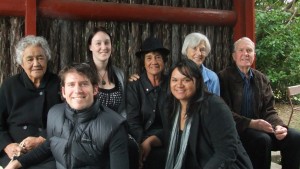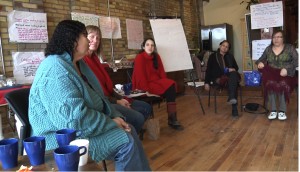My research aims to combine a variety of inter-disciplinary approaches to social-ecological resilience.. These include combining social well-being and health information such as social epidemiology, with phenomenological data, forms of participatory action research and narrative and arts-based inquiry. My research program is currently active in Canada, Aotearoa and Australia, based on grants from provincial and national funding organisations in Canada and New Zealand. Here is a selection of research projects.
Developing Promising Practices of Intergenerational Resilience
The bulk of my current research within the field of social-ecological resilience is currently focused on the development of practices within communities which strengthen intergenerational resilience.
Intergenerational or multi-generational resilience refers to the knowledge transmission and connectivity within and between species. The transfer of strength, wholeness, and knowledge to the next generation is critical not only for human well-being but for planetary continuance. In plain language, finding ways to nurture kinship relations with all life-forms is the ‘imperative’ of our times!
This international project is falls under the auspices of the international resilience network. For more information go to http://internationalresiliencenetwork.com and click on “Research and Publications”.
The Potential Contributions of Indigenous, Migrant and Refugee Women to our Ecological Wellbeing.
Principal Investigator Lewis Williams with a range of community partners. Funded by Canadian Institutes of Heath Research.
This is an applied and intercultural research project which explores issues of mental health, forced migration and belonging from a-depth ecology or Indigenous Life-World perspective with Indigenous, migrant and refugee women in Toronto, Canada and Auckland, Aotearoa New Zealand. While exploring issues such as trauma, poverty, and socio-cultural marginalization, it also recognizes that to varying extents these women are traditional knowledge keepers who have important contributions to make to ecological well-being. In encouraging conversations between groups who normally occupy very different discursive spaces and yet are similarly marginalized by globalization (and continued forms of colonization), this research challenges traditional ‘human capital’ approaches to migration, well-being and citizenship on which mainstream policies and programs are based. Through the contributions of these communities, this research seeks to envision a radical re-orientation of human consciousness and development aligned with healing the trauma of people and place.
Study Questions: Our inquiry includes the following key questions: 1) What might a depth ecology approach tell us about the ways in which this larger Life-World constitutes human subjectivity and related experiences of migration? (While there is abundant evidence of the impacts of human subjectivity on the physical (both animate and in the Western sense inanimate) and social landscapes, little is known about the reciprocal impacts of the larger Life World presence on human consciousness); and 2) How might bringing Indigenous, racialized migrant and refugee women together open up new possibilities for the ways in which these groups understand experiences of migration and well-being? In other words how might these conversations shift dominant discourses, reveal new understandings or assist in re-membering what has been dismembered through colonization?; and 3) What implications might these new understandings have for the ways in which public policies are conceptualized and framed? See www.kinincommon.com for more
“Spiritual and Intellectual Integrity is achieved….by the interplay of human and more than human consciousness…………Yet diminishing bio-diveristy augers against the continued capacity to know how to think with everything” (Sheridan and Longboat 2006: 369).
He Whanaunga Tera: The Politics and practice of an intercultural and Indigenous approach to ecological well-being.
Principal Investigator Lewis Williams.
 This Participatory Action Research project investigates the dynamics of people, power, culture and place in the work of building ecological alliances across cultures. It also seeks to surface indigenous ways of understanding ecological wellbeing in ways that are culturally relevant as well as through sharing knowledge across cultures. Currently in progess in Canada, New Zealand and Australia it aims to both develop theoretical understanding of these issues and build local capacity to engage in ecological action.
This Participatory Action Research project investigates the dynamics of people, power, culture and place in the work of building ecological alliances across cultures. It also seeks to surface indigenous ways of understanding ecological wellbeing in ways that are culturally relevant as well as through sharing knowledge across cultures. Currently in progess in Canada, New Zealand and Australia it aims to both develop theoretical understanding of these issues and build local capacity to engage in ecological action.
See www.kinincommon.com for more information.
Mauao: He Whanaunga te ra. A report for Ngai Te Rangi Kuia and Koroua.
Principal Investigator Lewis Williams.
Through interviews with Ngai Te Rangi elders, reviews of historical documentation and ethnographic methods, this research explored issues of wellbeing for Ngai Te Rangi through their relationship with their maunga (mountain) Mauao. In particular issues of meaning, identity and ecological well-being were investigated in relation to aspects of well-being such as mana (power), mauri (life-force energy), and Whanaunga (kinship). In summary it seeks to understand and communicate a Ngai Te Rangi and indigenous view of human ecology or human-environment relationships.
Healthcare policies, knowledge systems and approaches to mental well-being in Saskatchewan: A Cree perspective.
Principle Investigator Lewis Williams with Willie Ermine and Dr Janet Smylie. Funded by the Saskatchewan Health Research Foundation.
This research explored Cree concepts of mental health and investigated how these concepts may be incorporated into Saskatchewan’s healthcare system. Research was conducted through participatory and action approaches, interviews, and focus groups with individuals from the Sturgeon Lake First Nation (SLFN) community. Findings were analyzed alongside relevant mental health policies and programs in practice for the purpose of increasing the cultural relevance of healthcare policies and programs in the Province of Saskatchewan as they relate to mental health.
Identity, Culture and Power: Towards Frameworks of Self-Determination of Communities at the Economic and Cultural Margins.
Principal Investigator Lewis Williams. Funded by the Health Research Council of New Zealand.
This applied research utilized Participatory Action Research to investigate the self-determination of economically and culturally marginalized communities within the broader context of globalization. Undertaken in Aotearoa New Zealand and secondarily Canada, it researched community development as an empowerment methodology at the individual, community and institutional levels. The first part of this methodology involved community development work with a group of Tongan and Samoan women over 18 months in a low-income neighbourhood. This research theorized a power-culture approach to empowerment, developed a social action methodology and carried out some practical research aimed at addressing child health and safety conditions in state-owned housing.


